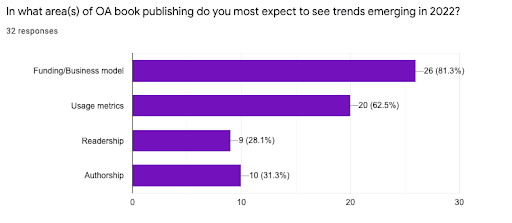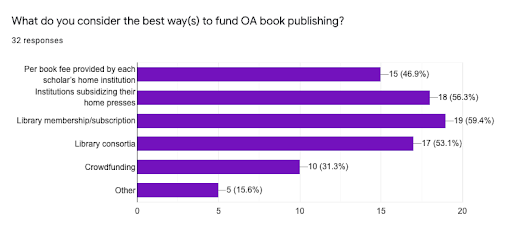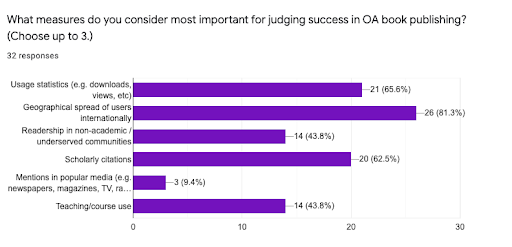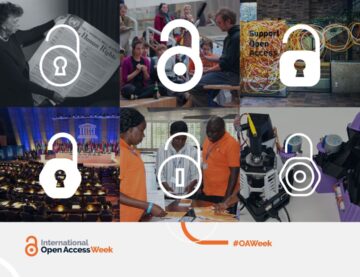Subscribe to our newsletter
Open Access Books – A World Beyond Covid
January can be a time for reflection on the past, or considering new beginnings. In this, our first open access monographs blog post of 2022 we want to do the latter and consider the question: What comes next? Specifically, what comes next for open access monographs as we cautiously start to envision life beyond COVID-19?
With this in mind, we reached out to a group that knows a lot about open access book publishing—the TOME community. TOME (Toward an Open Monograph Ecosystem) is an initiative that brings together scholars, librarians, publishers, and university administrators in pursuit of a sustainable open monograph ecosystem. The annual TOME stakeholders meeting was held in October 2021, with a focus on “Where do we go from here?”.
A post meeting survey asked the 135 participants to answer a number of questions regarding their current attitudes toward open access book publishing and what they expect/hope to see in 2022. 33 people (nearly 25%) completed the survey, and we explore the results below.
A clear message from the survey: open access monograph publishing has tremendous support. When asked whether or not open access has had a positive impact on scholarly book publishing, 91% of respondents believe that open access has had a positive impact on scholarly publishing. In addition, an overwhelming majority of respondents said that COVID-19 has positively affected their view of open access book publishing. Responses such as ‘It seems more necessary than ever’ and ‘We must make more of our valuable books open so as to keep people better informed of global issues’ were just two of the many supportive responses we received.
We had anticipated that the primary concern of most respondents would be metrics—metrics that might show increased usage and impact of open access monographs. While this certainly came out, it’s fair to say that the more pressing concern for most respondents was funding and support.
81% of respondents highlighted funding as the key issue that they expect to see the academy grapple with in the coming year/s
Looking to the future, when asked in what areas people most expected to see trends emerge, funding/business model was the dominant theme.

And in asking for more information on these trends, we heard: The funding/business model has to make sense for smaller publishers that simply cannot afford to have a large open access program. I would … expect to see, provosts and deans and libraries reaching a better understanding of the full costs of producing a monograph.”
Respondents also “expect more take-up of open access by faculty in the humanities and social sciences as more presses support open access monographs” and a call for “better, more fine-grained use of usage stats to persuade authors, institutions, and funding bodies that open access books are widely used,” indicating that further take up and metrics will be key.
On the topic of funding, there is clearly a key role for the library, with over half of respondents feeling that library membership, library consortia and subsidy of home presses should fund open access books.
Yet one model alone is not enough, as we heard calls for experimentation and engagement to advance open access books.
In summary, flexibility, diversity of options, support from the home institute and support for those not at rich institutes were some of the many issues raised. As befits a contentious and important discussion, there is no one single answer.

We also asked attendees what they considered to be the most important criterion for judging success in open access book publishing. Interestingly, this was wider international usage, followed by usage statistics and, of course, citations. Key here is that while metrics are useful and important, extending readership globally is considered more critical. Given that one of the earliest objectives of open access was the expansion of access to literature, this should not be surprising but it is encouraging nonetheless.

Finally, we asked attendees whether or not there was a role for TOME in the future of book publishing, following the conclusion of the pilot in 2022. All but two responses were strongly encouraging of TOME continuing, albeit with, perhaps, a shift in focus.
It seems clear that books are now poised to take their place in the increasingly interconnected world of openly accessible scholarly information. The time has come for all those with a stake in scholarly communication to pave the way for the open access monograph to flourish.
Peter Potter is Director, Publishing at Virginia Tech Publishing.
Please visit https://publishing.vt.edu/site/management-team/ to discover more about him and his work
Co-written with Sara Grimme, Senior Director of Operations, Dimensions Corporate. Contact her at s.grimme@digital-science.com



